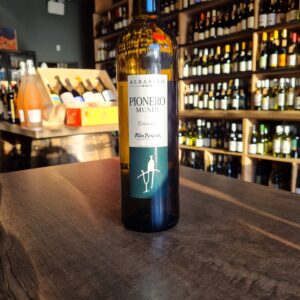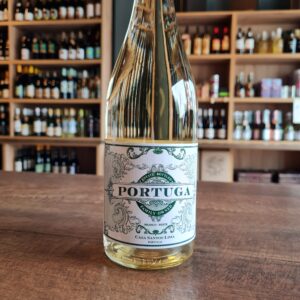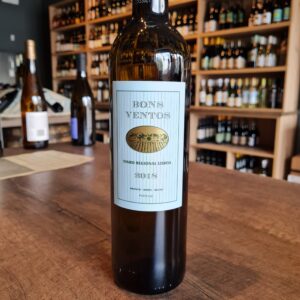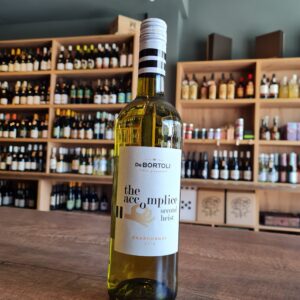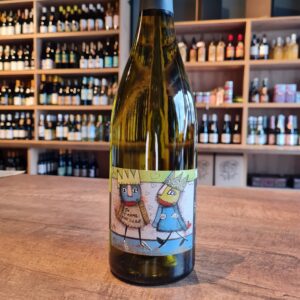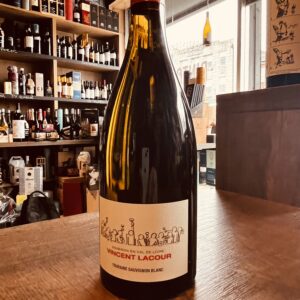-
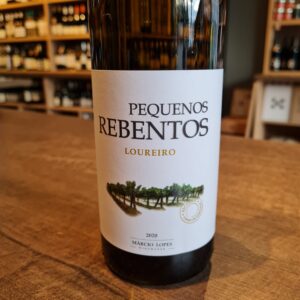 Márcio Lopes studied as an engineer, but cut his winemaking teeth working for two years with Vinho Verde master Anselmo Mendes in Melgaço. He then travelled to Australia where he made wine in Rutherglen and Tasmania, another cool climate region. He returned to Portugal in 2010 to start his own projects, including Pequenos Rebentos in Vinho Verde. He initially started working with Alvarinho and Trajadura (known as Albariño and Treixadura in Spain) from the sub-regions of Monção and Melgaço. These areas have a very particular microclimate, with slightly less Atlantic influence than the rest of the region - winters are cold with moderate rainfall and summers are hot and dry. During 2016 he also started to grow and vinify local varietals Loureiro. He now farms 5ha of vineyards, planted on granite, as well as buying some grapes from selected growers who also work in the same sustainable way and without herbicides. His winemaking is low intervention, he ferments using natural yeasts, and like many of our producers he believes that if the fruit is good enough he will make quality wines with balance that reflect his terroir. This seems to be working - his wines are distinctively fresh and vibrant, showing bright and clear typical variety aromas.
Márcio Lopes studied as an engineer, but cut his winemaking teeth working for two years with Vinho Verde master Anselmo Mendes in Melgaço. He then travelled to Australia where he made wine in Rutherglen and Tasmania, another cool climate region. He returned to Portugal in 2010 to start his own projects, including Pequenos Rebentos in Vinho Verde. He initially started working with Alvarinho and Trajadura (known as Albariño and Treixadura in Spain) from the sub-regions of Monção and Melgaço. These areas have a very particular microclimate, with slightly less Atlantic influence than the rest of the region - winters are cold with moderate rainfall and summers are hot and dry. During 2016 he also started to grow and vinify local varietals Loureiro. He now farms 5ha of vineyards, planted on granite, as well as buying some grapes from selected growers who also work in the same sustainable way and without herbicides. His winemaking is low intervention, he ferments using natural yeasts, and like many of our producers he believes that if the fruit is good enough he will make quality wines with balance that reflect his terroir. This seems to be working - his wines are distinctively fresh and vibrant, showing bright and clear typical variety aromas. -
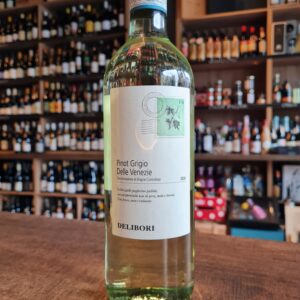 The Delibori Pinot Grigio delle Venezie impresses with its elegantly dry taste. It was bottled with exceptionally low residual sugar. This is a true quality wine, which clearly stands out from simpler qualities and so this Italian naturally enchants with the finest balance despite all dryness. Excellent taste does not necessarily require a lot of sugar. Light-footed and multi-layered, this light white wine presents itself on the palate. The final of this youthful white wine from the wine-growing region of Veneto, more precisely from Delle Venezie DOC, finally convinces with good reverberation. Best enjoyed moderately chilled at 11 - 13°C. It is perfect as an accompaniment to pumpkin casserole, vegetable stew with pesto or leek tortilla.
The Delibori Pinot Grigio delle Venezie impresses with its elegantly dry taste. It was bottled with exceptionally low residual sugar. This is a true quality wine, which clearly stands out from simpler qualities and so this Italian naturally enchants with the finest balance despite all dryness. Excellent taste does not necessarily require a lot of sugar. Light-footed and multi-layered, this light white wine presents itself on the palate. The final of this youthful white wine from the wine-growing region of Veneto, more precisely from Delle Venezie DOC, finally convinces with good reverberation. Best enjoyed moderately chilled at 11 - 13°C. It is perfect as an accompaniment to pumpkin casserole, vegetable stew with pesto or leek tortilla. -
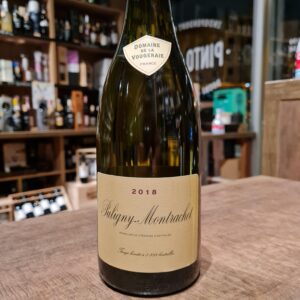 Domaine de La Vougeraie is born from the assembly of domains acquired over time and the vines of the family. Its history dates back to 1964 with the first vine, Les Evocelles, acquired by our father at his very beginnings. Here, it is in his village that he will have his first lands around Gevrey-Chambertin. The reputation of Domaine de la Vougeraie is well established. This area of excellence is located in Premeaux-Prissey, a small village in Burgundy , near Nuits-Saint-Georges, in the Côte de Nuits . For this cuvée, the estate brings together two small plots in the “ La Rue aux Vaches ” and “ Noyer Bret ” climates . They are planted with Chardonnay and worked in biodynamics , homeopathy applied to the vine. 2018 was a generous, sunny vintage, which managed to maintain a good level of freshness Sylvie Poillot, General Manager, farms the estate’s 42 hectares biodynamically. “We do this to preserve the fertility of soils, and to have a very good balance between the soil and the plant’s health,” she explains. It’s not just the soil health that’s changed: two decades on from their conversion to biodynamics, the wines are evolving too: “The wines are more aromatic and more expressive year after year,” she says. A fascinating 2018: on the one hand, it’s opulent with the warmth of the vintage; on the other, it’s tight with typical Puligny fruit, stone and bite. A superior example. Drink 2022-2028 Great with grilled fish, scallops, lobster, lobster
Domaine de La Vougeraie is born from the assembly of domains acquired over time and the vines of the family. Its history dates back to 1964 with the first vine, Les Evocelles, acquired by our father at his very beginnings. Here, it is in his village that he will have his first lands around Gevrey-Chambertin. The reputation of Domaine de la Vougeraie is well established. This area of excellence is located in Premeaux-Prissey, a small village in Burgundy , near Nuits-Saint-Georges, in the Côte de Nuits . For this cuvée, the estate brings together two small plots in the “ La Rue aux Vaches ” and “ Noyer Bret ” climates . They are planted with Chardonnay and worked in biodynamics , homeopathy applied to the vine. 2018 was a generous, sunny vintage, which managed to maintain a good level of freshness Sylvie Poillot, General Manager, farms the estate’s 42 hectares biodynamically. “We do this to preserve the fertility of soils, and to have a very good balance between the soil and the plant’s health,” she explains. It’s not just the soil health that’s changed: two decades on from their conversion to biodynamics, the wines are evolving too: “The wines are more aromatic and more expressive year after year,” she says. A fascinating 2018: on the one hand, it’s opulent with the warmth of the vintage; on the other, it’s tight with typical Puligny fruit, stone and bite. A superior example. Drink 2022-2028 Great with grilled fish, scallops, lobster, lobster -
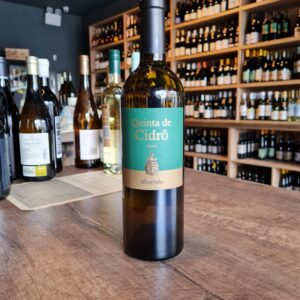 Quinta de Cidrô presents the first Alvarinho produced in the Douro, another superb result of the continuous innovation that takes place in the vineyards of the property. The idea to plant Alvarinho in the Douro came from their ambition to produce a high quality white monovarietal from a Portuguese grape variety. A wine marked by fine and delicate aromas of citrus fruit and orange blossom, which presents an excellent aromatic complexity. Expressive and personalized, it is above all a full-bodied Douro wine, revealing flavours that can be guessed at in the aroma. A long and distinct Alvarinho, determined by a crisp acidity and a tasty minerality.
Quinta de Cidrô presents the first Alvarinho produced in the Douro, another superb result of the continuous innovation that takes place in the vineyards of the property. The idea to plant Alvarinho in the Douro came from their ambition to produce a high quality white monovarietal from a Portuguese grape variety. A wine marked by fine and delicate aromas of citrus fruit and orange blossom, which presents an excellent aromatic complexity. Expressive and personalized, it is above all a full-bodied Douro wine, revealing flavours that can be guessed at in the aroma. A long and distinct Alvarinho, determined by a crisp acidity and a tasty minerality. -
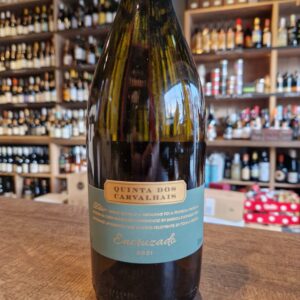 Sogrape Vinhos was founded in 1942 by Fernando van Zeller Guedes, with the ambition of making Portuguese wines known to the world and a long-term vision based on the quality of the wines to be marketed, the importance of the novelty of the brands, and the presentation of its wines. Today, led by the third generation of the founding family, Sogrape Vinhos is increasingly faithful to the goal it has had since it was founded: to be a family-owned company with an international vocation, focused on the production of quality wines, on innovation, and the development of global Portuguese brands. Sogrape Vinhos has about 830 hectares of vineyards in Portugal. Quinta dos Carvalhais is located in the municipality of Mangualde, near Nelas and Alcafache. The soil, the climate, the experience of those who have always produced wine make the Dão truly special. This 105-hectare estate, situated at an altitude of 465-500 metres, has 50 hectares under vine on predominantly granite soils. Warm days and cool nights at this altitude slow down the grape ripening process and result in wines with lovely depth yet vibrant fruit and a signature freshness. Precision viticulture is carried out on the estate with a multitude of different plots matched to specific grape varieties and harvested at different times. The fruit for the 2021 Encruzado was sourced from four different plots. Two cooler plots, one next to the lake on the estate and another often shaded by the oak trees, deliver a vibrant acidity the blend. Another plot with more sandy soils produces intensely aromatic grapes. All of the vineyards are farmed sustainably and harvesting is carried out by hand.
Sogrape Vinhos was founded in 1942 by Fernando van Zeller Guedes, with the ambition of making Portuguese wines known to the world and a long-term vision based on the quality of the wines to be marketed, the importance of the novelty of the brands, and the presentation of its wines. Today, led by the third generation of the founding family, Sogrape Vinhos is increasingly faithful to the goal it has had since it was founded: to be a family-owned company with an international vocation, focused on the production of quality wines, on innovation, and the development of global Portuguese brands. Sogrape Vinhos has about 830 hectares of vineyards in Portugal. Quinta dos Carvalhais is located in the municipality of Mangualde, near Nelas and Alcafache. The soil, the climate, the experience of those who have always produced wine make the Dão truly special. This 105-hectare estate, situated at an altitude of 465-500 metres, has 50 hectares under vine on predominantly granite soils. Warm days and cool nights at this altitude slow down the grape ripening process and result in wines with lovely depth yet vibrant fruit and a signature freshness. Precision viticulture is carried out on the estate with a multitude of different plots matched to specific grape varieties and harvested at different times. The fruit for the 2021 Encruzado was sourced from four different plots. Two cooler plots, one next to the lake on the estate and another often shaded by the oak trees, deliver a vibrant acidity the blend. Another plot with more sandy soils produces intensely aromatic grapes. All of the vineyards are farmed sustainably and harvesting is carried out by hand. -
 For those red wine lovers. You know what I mean by red lips! We brought together for you a red wine case of 6 bottles full of character, lavish richness, booming dark fruits, warming spice flavours, and velvet-smooth down to the very last drop. With this case you will travel from Portugal, Spain through France and Italy all the way to California. No doubt you will develop some red wine lips... Lab Tinto Lisboa - Lab tested and Lab approved! Full bodied, red produced on the coast of Lisbon, is smooth and is very aromatic with notes of ripe black and red fruits. On the palate, juicy plums and dark berry fruit flavour with plenty of fresh yet fine tannins that take over at the finish, along with flavours of spice and liquorice. It is not a top shelf wine but it does punch above its weight. Michel Chapoutier Marius - As Marius, Michel Chapoutier’s great-grandfather, always said ‘A good wine is one that beckons us to take another sip’. This wine carries this message and reflects the warmth of the southern french terroirs in which they are rooted. Dark red, dense, clear wine with deep purple shimmer. On the nose: powerful, complex, dark, spicy, red berries, delicate floral note. Château Haut Gravelier - Château Gravelier is located on superb hillsides on the edge of Entre Deux Mers, Bordeaux. Classic French blend of 70% Merlot 30% Cabernet Sauvignon. With deep colour, classic structure and unusually ripe flavours, this is classic claret to serve with roast beef, duck or T-bone steak. Palacio del Camino Crianza Rioja - The simple enjoyment of a really good Rioja is sometimes forgotten. But here one is, great with food, but honestly, just as great in a large glass on a sofa with nowhere to be and nothing to do. An elegant fruity wine with vanilla, spices and red fruit. Monte del Frá Bardolino DOC - This charming and typical red wine from Veneto is a cuvée made from 65% Corvina, 30% Rondinella and 5% Sangiovese, the usual suspects as Italian red grape varieties go. On the nose exudes aromas of different types of cherries, raspberries and strawberries. A whole range of spicy overtones and undertones play around this fruity core: cloves, cinnamon, violets and pepper. Tannins and fruit acid are perfectly coordinated. In the finale, some more cinnamon and black pepper. I would pair this one with pasta or your favourite comfort food. Beringer Zinfandel California - A Zin that definitely portrays some Classic California ripeness. Ripe blueberries, blackberries, plums, a hint of smoky and mineral characters and a touch perfumed (dried floral notes) on the nose. On the palate you'll find that smoke and berry ripeness coming through, with a little tangy raspberry adding to a lengthy finish. Medium plus body with a silky mouthfeel, smooth light tannins and luscious acidity. I love Zins with a juicy bacon and smoked cheddar burger or with your favourite pizza. This one should not disappoint!
For those red wine lovers. You know what I mean by red lips! We brought together for you a red wine case of 6 bottles full of character, lavish richness, booming dark fruits, warming spice flavours, and velvet-smooth down to the very last drop. With this case you will travel from Portugal, Spain through France and Italy all the way to California. No doubt you will develop some red wine lips... Lab Tinto Lisboa - Lab tested and Lab approved! Full bodied, red produced on the coast of Lisbon, is smooth and is very aromatic with notes of ripe black and red fruits. On the palate, juicy plums and dark berry fruit flavour with plenty of fresh yet fine tannins that take over at the finish, along with flavours of spice and liquorice. It is not a top shelf wine but it does punch above its weight. Michel Chapoutier Marius - As Marius, Michel Chapoutier’s great-grandfather, always said ‘A good wine is one that beckons us to take another sip’. This wine carries this message and reflects the warmth of the southern french terroirs in which they are rooted. Dark red, dense, clear wine with deep purple shimmer. On the nose: powerful, complex, dark, spicy, red berries, delicate floral note. Château Haut Gravelier - Château Gravelier is located on superb hillsides on the edge of Entre Deux Mers, Bordeaux. Classic French blend of 70% Merlot 30% Cabernet Sauvignon. With deep colour, classic structure and unusually ripe flavours, this is classic claret to serve with roast beef, duck or T-bone steak. Palacio del Camino Crianza Rioja - The simple enjoyment of a really good Rioja is sometimes forgotten. But here one is, great with food, but honestly, just as great in a large glass on a sofa with nowhere to be and nothing to do. An elegant fruity wine with vanilla, spices and red fruit. Monte del Frá Bardolino DOC - This charming and typical red wine from Veneto is a cuvée made from 65% Corvina, 30% Rondinella and 5% Sangiovese, the usual suspects as Italian red grape varieties go. On the nose exudes aromas of different types of cherries, raspberries and strawberries. A whole range of spicy overtones and undertones play around this fruity core: cloves, cinnamon, violets and pepper. Tannins and fruit acid are perfectly coordinated. In the finale, some more cinnamon and black pepper. I would pair this one with pasta or your favourite comfort food. Beringer Zinfandel California - A Zin that definitely portrays some Classic California ripeness. Ripe blueberries, blackberries, plums, a hint of smoky and mineral characters and a touch perfumed (dried floral notes) on the nose. On the palate you'll find that smoke and berry ripeness coming through, with a little tangy raspberry adding to a lengthy finish. Medium plus body with a silky mouthfeel, smooth light tannins and luscious acidity. I love Zins with a juicy bacon and smoked cheddar burger or with your favourite pizza. This one should not disappoint! -
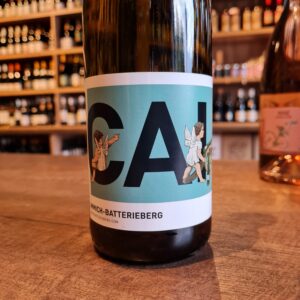 Immich-Batterieberg is one of the oldest wineries in the Mosel; originally founded by a Carolingian monastery, it can be traced back to the year 911. In 1495, the Immich family purchased the property, producing traditional dry and off-dry wines under their name for almost 500 years. The historical estate was then acquired in 2009 by Gernot Kollmann, one of Germany's finest up and comers. He is no stranger to the Mosel, having worked on many prestigious wineries in the region – Dr. Loosen, Weingut Van Volxem and Knebel. Since taking over, he has chosen to retain the long-standing tradition of the winery. The wines are once again produced in a dry or off-dry style, with sugar levels depending on each site, each vintage.80-percent of the vines are un-grafted and over 60 years old, and everything is worked organically. Intervention during vinification is also forbidden. A crisp, crunchy, keenly balanced, TOTALLY DRY trocken style Riesling.
Immich-Batterieberg is one of the oldest wineries in the Mosel; originally founded by a Carolingian monastery, it can be traced back to the year 911. In 1495, the Immich family purchased the property, producing traditional dry and off-dry wines under their name for almost 500 years. The historical estate was then acquired in 2009 by Gernot Kollmann, one of Germany's finest up and comers. He is no stranger to the Mosel, having worked on many prestigious wineries in the region – Dr. Loosen, Weingut Van Volxem and Knebel. Since taking over, he has chosen to retain the long-standing tradition of the winery. The wines are once again produced in a dry or off-dry style, with sugar levels depending on each site, each vintage.80-percent of the vines are un-grafted and over 60 years old, and everything is worked organically. Intervention during vinification is also forbidden. A crisp, crunchy, keenly balanced, TOTALLY DRY trocken style Riesling. -
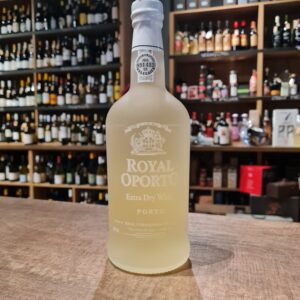 The Port is by difinition, generous and full-bodied wine, produced in the region Douro- the demarcated region of the world's oldest wines. Made from grapes traditionally used in the region, its wine making process is characterized by adding brandy to the wine in full fermentation. This type of port that inspires moments and new forms of consumption, which we recommend be served as Port Tonic. Classic serving would be as a chilled aperitif, but also you could be adventurous and make a ''Caipi Royal'' or just serve it on the rocks with an orange slice.
The Port is by difinition, generous and full-bodied wine, produced in the region Douro- the demarcated region of the world's oldest wines. Made from grapes traditionally used in the region, its wine making process is characterized by adding brandy to the wine in full fermentation. This type of port that inspires moments and new forms of consumption, which we recommend be served as Port Tonic. Classic serving would be as a chilled aperitif, but also you could be adventurous and make a ''Caipi Royal'' or just serve it on the rocks with an orange slice. -
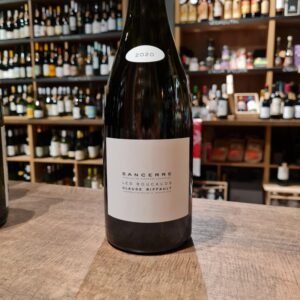 At barely 30 years old, Stephane Riffault (Claude’s son and now owner of the estate) is turning out Sancerre bottlings that are the envy of many producers twice his age. As David Schildknecht put it, “make no mistake: this address in the hamlet of Maison Salle (Sury-en-Vaux) is now one of the five or six most exciting estates in the Sancerre appellation.” Given that Stephane’s holdings represent 4 tenths of 1 percent of the appellation, this kid is clearly doing something right. Based in the village of Sury-en-Vaux, the domaine works 33 different parcels in 6 different lieu-dits spread across 4 villages. The 13.5 hectares of vines are plowed and no synthetic material is used. Unlike most Sancerre producers, the entire harvest is carried out by hand and an extensive sorting takes place before the grapes are crushed. Stephane’s wife, Benedicte, leads the harvest team while Stephane manages the sorting and press during harvest. Most of the domaine’s holdings are planted on the soft limestone soil called Terres Blanches with some parcels on calliottes and silex. Small, judicious uses of oak help to add length to the already precise and vertical bottling. All of the parcels are vilified separately and with the exception of the rose, all the wines are bottled unfiltered. Having studied and worked in Burgundy (and closely with Olivier Leflaive), it’s easy to see the Burgundian influence in Stephane’s wines. The mastery of minerality standing shoulder-height with the wood is rarely duplicated in Sancerre. Regardless of the exposition of his parcels (many are south-facing), Riffault’s wines are always crisp and high-cut with a jeweled sort of delineation that speaks to the precision and attention these wines get. These are not your daddy’s (or his daddy’s) Sancerres.
At barely 30 years old, Stephane Riffault (Claude’s son and now owner of the estate) is turning out Sancerre bottlings that are the envy of many producers twice his age. As David Schildknecht put it, “make no mistake: this address in the hamlet of Maison Salle (Sury-en-Vaux) is now one of the five or six most exciting estates in the Sancerre appellation.” Given that Stephane’s holdings represent 4 tenths of 1 percent of the appellation, this kid is clearly doing something right. Based in the village of Sury-en-Vaux, the domaine works 33 different parcels in 6 different lieu-dits spread across 4 villages. The 13.5 hectares of vines are plowed and no synthetic material is used. Unlike most Sancerre producers, the entire harvest is carried out by hand and an extensive sorting takes place before the grapes are crushed. Stephane’s wife, Benedicte, leads the harvest team while Stephane manages the sorting and press during harvest. Most of the domaine’s holdings are planted on the soft limestone soil called Terres Blanches with some parcels on calliottes and silex. Small, judicious uses of oak help to add length to the already precise and vertical bottling. All of the parcels are vilified separately and with the exception of the rose, all the wines are bottled unfiltered. Having studied and worked in Burgundy (and closely with Olivier Leflaive), it’s easy to see the Burgundian influence in Stephane’s wines. The mastery of minerality standing shoulder-height with the wood is rarely duplicated in Sancerre. Regardless of the exposition of his parcels (many are south-facing), Riffault’s wines are always crisp and high-cut with a jeweled sort of delineation that speaks to the precision and attention these wines get. These are not your daddy’s (or his daddy’s) Sancerres. -
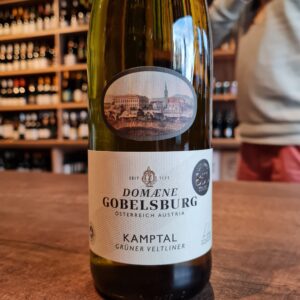 Like every vintage, the Grüner Veltliner Domain Gobelsburg is the benchmark wine in this price range, balanced, juicy and delicate, that's how Veltliner is fun. Delicate spice on the nose with some Boskop apple, Williams pear and herbaceous hints of thyme and mint. On the palate a rather soft texture, gentle fruit with a nice acidic accompaniment, delicately piquant pepper, then some minerality comes through. Again one of the most harmonious entry-level Veltliners of this vintage!
Like every vintage, the Grüner Veltliner Domain Gobelsburg is the benchmark wine in this price range, balanced, juicy and delicate, that's how Veltliner is fun. Delicate spice on the nose with some Boskop apple, Williams pear and herbaceous hints of thyme and mint. On the palate a rather soft texture, gentle fruit with a nice acidic accompaniment, delicately piquant pepper, then some minerality comes through. Again one of the most harmonious entry-level Veltliners of this vintage! -
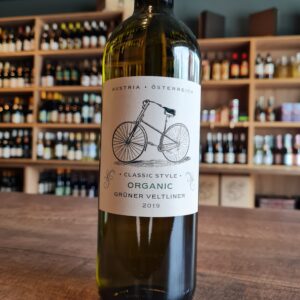 All Sepp Moser wines have been organic (and all estate wines biodynamic) since 2007. The Sepp Moser Estate comprises of 50 acres of vineyards in two prominent wine regions; Kremstal and Neusiedlersee. Now run by Sepp's son Nikolaus, he produces an international range of varieties as well as the ever more important local varieties of Gruner Veltliner and Riesling in the Kremstal. Delicate aromas of pear, kiwi, apricot and white spice. On the palate stone fruit flavours and white pepper lead to a gently textured, mineral and citrus finish. Great with fish, Chicken or light dishes in general. Lovely on its own on hot summer day
All Sepp Moser wines have been organic (and all estate wines biodynamic) since 2007. The Sepp Moser Estate comprises of 50 acres of vineyards in two prominent wine regions; Kremstal and Neusiedlersee. Now run by Sepp's son Nikolaus, he produces an international range of varieties as well as the ever more important local varieties of Gruner Veltliner and Riesling in the Kremstal. Delicate aromas of pear, kiwi, apricot and white spice. On the palate stone fruit flavours and white pepper lead to a gently textured, mineral and citrus finish. Great with fish, Chicken or light dishes in general. Lovely on its own on hot summer day -
Out of stock
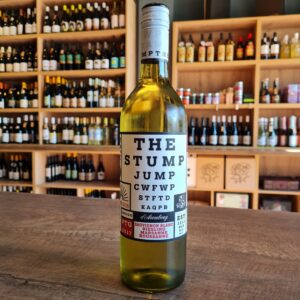 The name ‘Stump Jump’ doesn’t relate to the English game of cricket (jumping over the stumps at the end of the game), nor the breeding of livestock held in the stumps but relates to the significant South Australian invention – the Stump Jump plough. The plough soon became a worldwide implement for ploughing fields because of its ability to ride over stumps and gnarled “mallee” Eucalypt roots and snags, saving valuable time and energy by not stopping the draught horse. Every Stump Jump white of late seems to take the drinker on an interesting journey and this one is no exception. A wonderful fresh vibrant appearance with an equally appealing aroma. Notes of florals, cut grass and limes are obvious but as the wine opens up, more complex secondary notes appear such as green melon rind, passionfruit, lavender, wheat germ, and almond kernel characters. The palate is dry with a moderate level of intensity and ripe fruit characters dominated with Riesling florals and limes; the grassy sweetness and elevated acidity of the Sauvignon Blanc while the Roussanne and Marsanne add an earthy, dry stone fruit element, green almond kernels and a lovely viscous character giving textural richness to the finish. The wine has excellent balance and length of flavour which we see as being an essential element in a great value drink. The Stump Jump is at its best drinking while young, and will continue to develop in the bottle over the next three to five years. It is perfect drinking on a warm summer’s day, and a perfect match for a wide variety of light dishes.
The name ‘Stump Jump’ doesn’t relate to the English game of cricket (jumping over the stumps at the end of the game), nor the breeding of livestock held in the stumps but relates to the significant South Australian invention – the Stump Jump plough. The plough soon became a worldwide implement for ploughing fields because of its ability to ride over stumps and gnarled “mallee” Eucalypt roots and snags, saving valuable time and energy by not stopping the draught horse. Every Stump Jump white of late seems to take the drinker on an interesting journey and this one is no exception. A wonderful fresh vibrant appearance with an equally appealing aroma. Notes of florals, cut grass and limes are obvious but as the wine opens up, more complex secondary notes appear such as green melon rind, passionfruit, lavender, wheat germ, and almond kernel characters. The palate is dry with a moderate level of intensity and ripe fruit characters dominated with Riesling florals and limes; the grassy sweetness and elevated acidity of the Sauvignon Blanc while the Roussanne and Marsanne add an earthy, dry stone fruit element, green almond kernels and a lovely viscous character giving textural richness to the finish. The wine has excellent balance and length of flavour which we see as being an essential element in a great value drink. The Stump Jump is at its best drinking while young, and will continue to develop in the bottle over the next three to five years. It is perfect drinking on a warm summer’s day, and a perfect match for a wide variety of light dishes. -
Out of stock
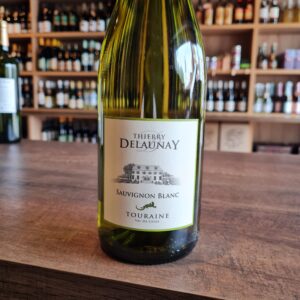 Touraine is the savvy place to look if you’re after a Sauvignon blanc which combines great value with great flavour. The Loire is Sauvignon Blanc’s homeland. So it’s no surprise that Loire native, Thierry Delaunay, is passionate about the grape. Decades of his family making wine in the region means he has the pick of the crop when it comes to choosing grapes for his wines. He looks for the best grapes from the best pockets of vines in Touraine – and the results speak for themselves. This Sauvignon is seriously refreshing, seriously citrusy, and seriously good value. You’ll find nothing finer to pair with a goat’s cheese tart. And its more restrained flavour profile makes it a perfect party wine. Santé.
Touraine is the savvy place to look if you’re after a Sauvignon blanc which combines great value with great flavour. The Loire is Sauvignon Blanc’s homeland. So it’s no surprise that Loire native, Thierry Delaunay, is passionate about the grape. Decades of his family making wine in the region means he has the pick of the crop when it comes to choosing grapes for his wines. He looks for the best grapes from the best pockets of vines in Touraine – and the results speak for themselves. This Sauvignon is seriously refreshing, seriously citrusy, and seriously good value. You’ll find nothing finer to pair with a goat’s cheese tart. And its more restrained flavour profile makes it a perfect party wine. Santé. -
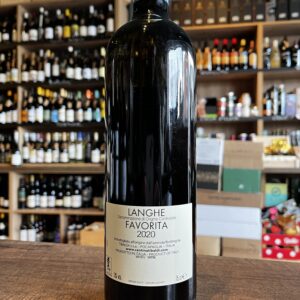
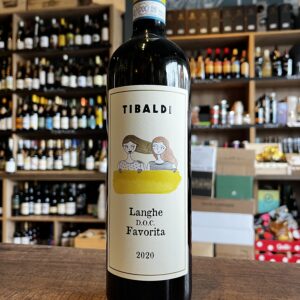 Normally I look for the inside story and drop it here. I reckon in this case its so personal that I let them tell their story... ''We are Monica and Daniela, two sisters born and raised breathing love for the winegrowing in the Roeroa colourful land, rich in biodiversity that fills us with new stimuli every day. We have inherited a passion for vines and grapes, by our father Stefano and grandfather Tunin, and so we decided to start winemaking and bet on Pocapaglia. We manage the entire wine production process: from the vineyard, where our father's help is still fundamental, to the cellar, without neglecting marketing. We both believe in commitment and tenacity, two essential ingredients to achieve the desired quality. Together we have fun, for us it is not just an occupation but it is a life choice that sees us immersed in our passion eight days a week!'' Life can be so simple and yet produce amazing and complex things... If you like Vermentino you will like this as it is its clone Pair it with someone you love
Normally I look for the inside story and drop it here. I reckon in this case its so personal that I let them tell their story... ''We are Monica and Daniela, two sisters born and raised breathing love for the winegrowing in the Roeroa colourful land, rich in biodiversity that fills us with new stimuli every day. We have inherited a passion for vines and grapes, by our father Stefano and grandfather Tunin, and so we decided to start winemaking and bet on Pocapaglia. We manage the entire wine production process: from the vineyard, where our father's help is still fundamental, to the cellar, without neglecting marketing. We both believe in commitment and tenacity, two essential ingredients to achieve the desired quality. Together we have fun, for us it is not just an occupation but it is a life choice that sees us immersed in our passion eight days a week!'' Life can be so simple and yet produce amazing and complex things... If you like Vermentino you will like this as it is its clone Pair it with someone you love -
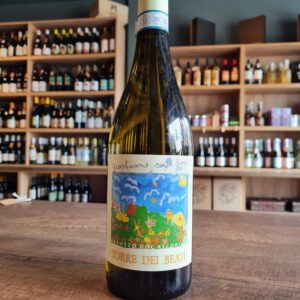 Pecorino We will play with the Flowers of Torre dei Beati born in the vineyards located on the hills at the foot of the Gran Sasso, in the heart of the Abruzzo region.It is produced exclusively with Pecorino grapes, recently recovered in Italy as an ancient grape. The Pecorino is a native vine of poor productivity and great enological interest, which is deserving the attention of the fans. Torre dei Beati uses traditional and non-intrusive winemaking techniques. After fermentation in stainless steel tanks at controlled temperature, the wine ages in steel before being bottled. It is characterized by a straw yellow color with golden reflections. The nose is fine and elegant, with hints of pear and white flowers, rounded by pleasant honeyed notes and hints of medicinal herbs. On the palate it is soft and with an excellent balance between alcohol, acidity and minerality. The wine has a long lasting and stimulating finish. Perfect to accompany aperitifs, appetizers and fish dishes, it is ideal in combination with white meats and first courses.
Pecorino We will play with the Flowers of Torre dei Beati born in the vineyards located on the hills at the foot of the Gran Sasso, in the heart of the Abruzzo region.It is produced exclusively with Pecorino grapes, recently recovered in Italy as an ancient grape. The Pecorino is a native vine of poor productivity and great enological interest, which is deserving the attention of the fans. Torre dei Beati uses traditional and non-intrusive winemaking techniques. After fermentation in stainless steel tanks at controlled temperature, the wine ages in steel before being bottled. It is characterized by a straw yellow color with golden reflections. The nose is fine and elegant, with hints of pear and white flowers, rounded by pleasant honeyed notes and hints of medicinal herbs. On the palate it is soft and with an excellent balance between alcohol, acidity and minerality. The wine has a long lasting and stimulating finish. Perfect to accompany aperitifs, appetizers and fish dishes, it is ideal in combination with white meats and first courses. -
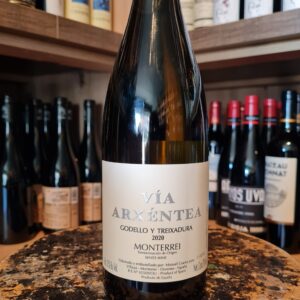 DO Monterrei is the smallest of the Galician DOs and the most recent, having been created in 1996. It is an emerging region located in the province of Ourense in the south-east of Galicia, on the border with Portugal. The Atlantic influence here is not as strong and the climate is hotter and more continental than the rest of Galicia, making it possible to produce impressive whites from Treixadura and Godello as well as reds from autochtonous Mencia. Most of the vineyards are located on the slopes lining the River Támega where the soil has a deep red colour with a high clay content. After spending many years working for other wineries in the area around Galicia, Manuel Guerra Justo decided to break away and set up his own adega, “Via Arxentea”, literally translated as “ The Silver Route”, the local name for the important pilgrimage route of El Camino de Santiago to Santiago de Compostela. Manuel Guerra is a “Colleitero” and therefore responsible for the entire production cycle, from the care in the vineyard to the winemaking. He is the first to acknowledge that the secret to achieving purity and varietal expression in his wines is in his vineyard management which he attends to personally and pampers vine by vine as if they were his own children, with the sole objective of achieving maximum quality. Under the consultancy of well known winemaker, Alvaro Bueno, Manuel Guerra Justo owns four hectares around Verin, planted almost equally between Godello and Treixadura and a small batch of Mencia. Vía Arxentea wine are made from estate bottled fruit, harvested by hand and fermented using indigenous yeasts.
DO Monterrei is the smallest of the Galician DOs and the most recent, having been created in 1996. It is an emerging region located in the province of Ourense in the south-east of Galicia, on the border with Portugal. The Atlantic influence here is not as strong and the climate is hotter and more continental than the rest of Galicia, making it possible to produce impressive whites from Treixadura and Godello as well as reds from autochtonous Mencia. Most of the vineyards are located on the slopes lining the River Támega where the soil has a deep red colour with a high clay content. After spending many years working for other wineries in the area around Galicia, Manuel Guerra Justo decided to break away and set up his own adega, “Via Arxentea”, literally translated as “ The Silver Route”, the local name for the important pilgrimage route of El Camino de Santiago to Santiago de Compostela. Manuel Guerra is a “Colleitero” and therefore responsible for the entire production cycle, from the care in the vineyard to the winemaking. He is the first to acknowledge that the secret to achieving purity and varietal expression in his wines is in his vineyard management which he attends to personally and pampers vine by vine as if they were his own children, with the sole objective of achieving maximum quality. Under the consultancy of well known winemaker, Alvaro Bueno, Manuel Guerra Justo owns four hectares around Verin, planted almost equally between Godello and Treixadura and a small batch of Mencia. Vía Arxentea wine are made from estate bottled fruit, harvested by hand and fermented using indigenous yeasts. -
Out of stock
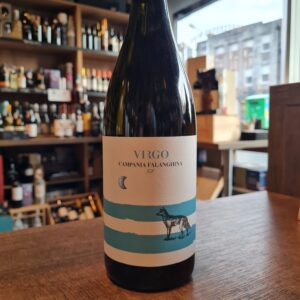 Villa Raiano was founded in 1996 in the old factories of the Basso family's oil mill, owner of the company in the Raiano hamlet of the municipality of Serino (AV). Built in 2009, the is structure perfectly integrated into the surrounding environment, surrounded by vineyards and woods. On top of it a panoramic terrace overlooking a wonderful valley carved by the river Sabato which descends proudly from Monte Terminio. This delicious summer wine from the extreme south of Italy makes you long for Italy. A delicious, light-footed summer wine with a sultry taste of honey, flowers and fresh notes of citrus fruits. The Falanghina grape is still relatively unknown in the Ireland, but in Italy a guarantee for a smooth summer wine that can be drunk on it's own or over lunch.The artisan winemakers of Villa Raiano are behind this fantastic Virgo Falanghina, you can expect high quality. In addition, all grapes are picked by hand by Gabrizia and her brothers. And you can taste it! A delicious traditional wine that is made with the utmost care in a sustainable way.
Villa Raiano was founded in 1996 in the old factories of the Basso family's oil mill, owner of the company in the Raiano hamlet of the municipality of Serino (AV). Built in 2009, the is structure perfectly integrated into the surrounding environment, surrounded by vineyards and woods. On top of it a panoramic terrace overlooking a wonderful valley carved by the river Sabato which descends proudly from Monte Terminio. This delicious summer wine from the extreme south of Italy makes you long for Italy. A delicious, light-footed summer wine with a sultry taste of honey, flowers and fresh notes of citrus fruits. The Falanghina grape is still relatively unknown in the Ireland, but in Italy a guarantee for a smooth summer wine that can be drunk on it's own or over lunch.The artisan winemakers of Villa Raiano are behind this fantastic Virgo Falanghina, you can expect high quality. In addition, all grapes are picked by hand by Gabrizia and her brothers. And you can taste it! A delicious traditional wine that is made with the utmost care in a sustainable way. -
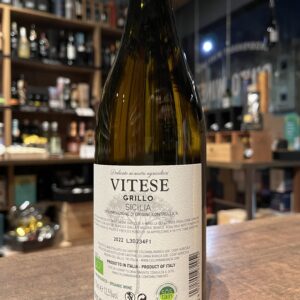
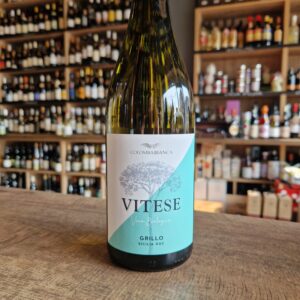 The Colomba Bianca winery was founded in 1970. During the last 10 years, under the guidance of our Chairman Leonardo Taschetta, it has become the biggest wine growing co-operative in Sicily. The company today, can, in fact, count on circa 2480 partners and extends along 7500 hectars of vineyards between the provinces of Trapani, Palermo, Agrigento, Caltanissetta e Ragusa, with 5 wineries distributed in the whole territory. The vineyards can be found in areas which benefit of a vast pedoclimatic diversity, from the low coastal areas up to an altitude of 600 metres above sea level. "We work with the aim that our farmers receive the right compensation for their work. This adds dignity to Sicilian agriculture and to the wines which express at best our territory. It is for this reason that each one of our wines is dedicated to our farmers." - Colomba Bianco Grillo is the flagship of Sicily's indigenous white varieties. Famous for its role in the production of Marsala wines, but has recently come into its own as a varietal making light, fresh and citrussy wines. Ideal with fish first courses, delicate risottos and white meat dishes.
The Colomba Bianca winery was founded in 1970. During the last 10 years, under the guidance of our Chairman Leonardo Taschetta, it has become the biggest wine growing co-operative in Sicily. The company today, can, in fact, count on circa 2480 partners and extends along 7500 hectars of vineyards between the provinces of Trapani, Palermo, Agrigento, Caltanissetta e Ragusa, with 5 wineries distributed in the whole territory. The vineyards can be found in areas which benefit of a vast pedoclimatic diversity, from the low coastal areas up to an altitude of 600 metres above sea level. "We work with the aim that our farmers receive the right compensation for their work. This adds dignity to Sicilian agriculture and to the wines which express at best our territory. It is for this reason that each one of our wines is dedicated to our farmers." - Colomba Bianco Grillo is the flagship of Sicily's indigenous white varieties. Famous for its role in the production of Marsala wines, but has recently come into its own as a varietal making light, fresh and citrussy wines. Ideal with fish first courses, delicate risottos and white meat dishes.


